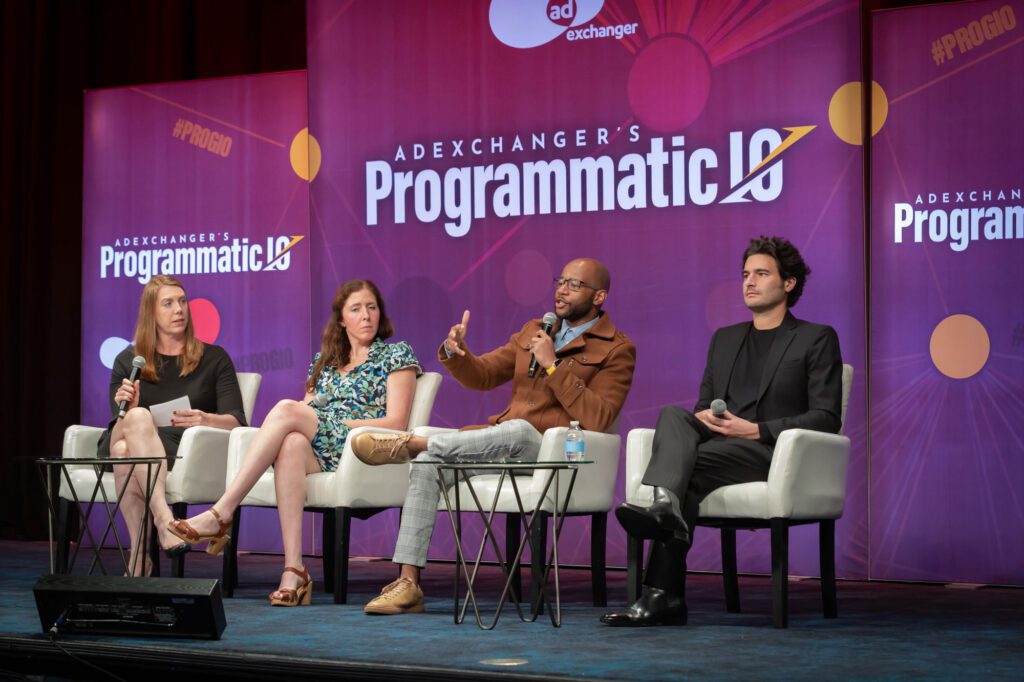With a recession looming and even more signal loss on the way, publishers need to experiment to find the best mix of revenue-generating solutions and approaches.
But for some publishers, the post-cookie era has already arrived.
For example, Bloomberg is using the first-party data derived from its subscriber base to find lookalike audiences with the potential to become new subscribers, said Julia Beizer, chief digital officer at Bloomberg Media, speaking at AdExchanger’s Programmatic I/O conference in New York City this week.
In addition to having its own suite of first-party-data-based ad products, Bloomberg recently announced plans to discontinue all open web programmatic display advertising on its properties.
Sustainable revenue
Bloomberg’s subscription-focused strategy works for Bloomberg because, well, Bloomberg is Bloomberg.
But smaller, less-established publishers are better served by having a diverse array of revenue streams, said Jeff Nelson, COO at Blavity, a digital media company focused on black culture.
“Ultimately our goal is to serve better experiences for users, to know them more intimately and to give them reasons to opt into what we’re providing and volunteer their data – but it’s a journey to get there,” Nelson said.
One challenge for publishers like Blavity is to balance a good site experience while also continuing to generate open-web programmatic, he said.
But publishers can avoid the pitfalls of open exchanges by offering a streamlined onsite ad experience and emphasizing performance, said Daniel Papalia, VP of programmatic revenue and strategy at Dotdash Meredith.
“We’re getting as close as we can to both our users and our advertiser partners, and the open exchange is one avenue to get there,” Papalia said.
Recession questions
With a possible recession threatening to upend the economy, publishers have all the more reason to reevaluate their revenue models.
But experimenting with new approaches isn’t always the answer. In some cases, it may be smarter for a publisher to double down on what works for their particular business, Beizer said.
“The media industry gets so excited about new trends and trying new things,” she said. “Leaner times force prioritization. My answer is focus on [figuring out] what you’re about, [who] you serve and how you make the money.”
Smaller publishers don’t necessarily have that luxury, though, Nelson said. “For us, it’s scary to think about how we prepare for [a recession], and we look at it as an opportunity to experiment and diversify,” he said.
Dotdash Meredith, meanwhile, is preparing for a potential economic downturn by emphasizing outcomes and looking for partners that can help drive performance and that also have a strong service offering, Papalia said.
“Service has fallen off in a lot of respects, so focusing on the partners that lean into helping you out is going to be increasingly important as we move forward,” he said.
And because programmatic budgets were one of the first line items to get cut by 2020’s pandemic-related recession – programmatic is as easy for buyers to turn off as it is to turn on – publishers should keep a close eye on their programmatic revenue to stay ahead of any downward trend, Papalia said.
More than just ads
But first-party data should be a priority regardless of whether a recession hits.
The conversation about first-party data typically centers on how to apply that data to advertising use cases. There are, however, other benefits for publishers that build their own first-party data operations.
“Think about the additional incremental business opportunities there are to serve your customer,” said Nelson, who pointed to how the data Blavity gathers on its audience can also be used to inform other areas of its business.
“If we understand that [someone is] looking to hire or they’re looking for a job, how does that connect to our career and talent acquisition business where we connect employers with diverse talent?” Nelson said.
The many applications of first-party data for intent- and ecommerce-focused publishers, like Dotdash Meredith, can’t be overstated, Papalia said.
“Using first-party data to inform both advertising and commerce outcomes is going to be the future,” he said.













